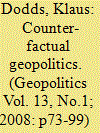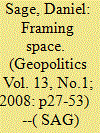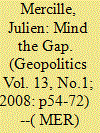|
|
|
Sort Order |
|
|
|
Items / Page
|
|
|
|
|
|
|
| Srl | Item |
| 1 |
ID:
081556


|
|
|
|
|
| Publication |
2008.
|
| Summary/Abstract |
In this paper, a counter-factual geopolitics is addressed with specific reference to the US presidential election of November 2000. What difference would it have made if President Al Gore had been confirmed as holder of that office rather than George W. Bush? Would we have had a very different kind of response to September 11th for example? By focusing on some of the speeches and remarks given by Al Gore, we consider how a different strategy might have emerged following that momentous event. It is contended, however, that despite what the anti-Bush critics might have wished for, the geopolitical and spatial consequences of a Gore administration might have differed only on tactics and strategies rather than fundamental principles. By way of conclusion, the paper considers how counter-factualism might contribute to the further development of critical geopolitical scholarship
|
|
|
|
|
|
|
|
|
|
|
|
|
|
|
|
| 2 |
ID:
081554


|
|
|
|
|
| Publication |
2008.
|
| Summary/Abstract |
This paper examines how 'ways of seeing' landscape, as practised within the little-known American astronomical art community, can be used to examine the popular geopolitical scripting of an American manifest destiny in outer space. A significant body of work in critical geopolitics has sought to recognise the way in which culturally manifest representations of space and place, together with embedded visual practices, can reproduce and elucidate the construction of geographical imaginations. Despite this, cultural representations of outer space have frequently been overlooked in readings of American popular, geopolitical discourse and associated geographical understandings. As a response to this lacuna, this paper interrogates how visual motifs of an American manifest destiny, developed in nineteenth-century American romanticism, have been mobilised through American astronomical art to explain and popularise conceptions of outer space that invite American human space exploration. By way of conclusion, the paper stresses how the inscription of outer space under the rubric of an American manifest destiny continues to frame the way in which the American space programme, and by extension American geopolitical and geographical imaginations, can be understood today
|
|
|
|
|
|
|
|
|
|
|
|
|
|
|
|
| 3 |
ID:
081553


|
|
|
|
|
| Publication |
2008.
|
| Summary/Abstract |
The simultaneous rise of China and now India is a fundamental factor for understanding the twenty-first century. In rising as Great Powers, a relative term, they are coming up against each other across Asia and its surrounding waters. Traditional geopolitical models, Mackinder, Spykman and Mahan point to their spatial politics around Central Asia, South Asia, Pacific Asia and the Indian Ocean. Actual spatial settings are combined with perceived spatial outlooks. These powerful neighbouring states seek to continue rising, and constrain the other where necessary through mutual encirclement and alliances/proxies. This type of 'Great Game' is evident in the military-security, diplomatic and economic areas. Globalisation has not replaced regionalism, nor has geoeconomics replaced geopolitics. The stakes are high as is their need for securing access to energy resources for their economics-led rise to Great Power status. Some cooperation is evident, in line with IR liberalism-functionalism. However, geopolitical IR realism and security dilemma perceptions still shape much of their actions
|
|
|
|
|
|
|
|
|
|
|
|
|
|
|
|
| 4 |
ID:
081557


|
|
|
|
|
| Publication |
2008.
|
| Summary/Abstract |
Realist academics wrote some of the most lucid critiques of the geopolitics of anger initiated after 9/11 by the Bush administration: John Mearsheimer and Stephen Walt, in particular, began to interrogate the War on Terror with lines of inquiry that lead back to the critiques of U.S. foreign policy-and the 'fantasies' and 'self-deception' of policy makers-developed in the 1960s by Hans Morgenthau and Hannah Arendt. But then Walt and Mearsheimer published controversial essays on 'The Israel Lobby' based on arguments developed in Walt's Taming American Power. What interests me in the paper is accounting for a curious move that occurs in the writings of Mearsheimer and Walt since 9/11. By the time that we arrive at Walt's Taming American Power and the essays on 'The Israel Lobby', critical commentary on the 'self-deception' of policy makers and the problems with neo-conservatism has largely disappeared, replaced with an anxiety over the Israel lobby that appears overstated. It is argued that the emphasis on foreign 'penetration' is a means of postponing a broader interrogation of the domestic, internal problems of democracy and war in the United States
|
|
|
|
|
|
|
|
|
|
|
|
|
|
|
|
| 5 |
ID:
081555


|
|
|
|
|
| Publication |
2008.
|
| Summary/Abstract |
US politics seems to be chronically afflicted with high levels of military spending justified by security "crises", the current upsurge under the Bush administration being only the latest episode in a long series. This paper addresses the question, "Why are the levels of US military spending so high?" to which it provides a "radical" geographical answer. Although in the conclusion I offer thoughts on how my points apply to the current situation, I do not claim that the analysis applies directly to the post-war period as a whole, but only to that of the case study, the bomber and missile gaps of 1955-1961, two successive "crises" that led to increases in defence expenditures. I argue that although the "immediate" causes of the "gaps" and ensuing military spending may be found at the national and local scales, some of their fundamental roots are to be located in US post-war plans to organise the global space of the capitalist world economy. I will show how such plans?-?as found in important declassified documents like NSC-68 and the Gaither Report as well as those related to the Vietnam War and counterinsurgency policies?-?explicitly called for military spending to maintain American hegemony. Moreover, those documents reveal geographical assumptions reminiscent of Mackinder's geopolitics, hegemony and world-systems theories. Finally, examining the geopolitics and geoeconomics of US military spending makes a contribution to a subject to which geographers have paid only limited attention
|
|
|
|
|
|
|
|
|
|
|
|
|
|
|
|
|
|
|
|
|